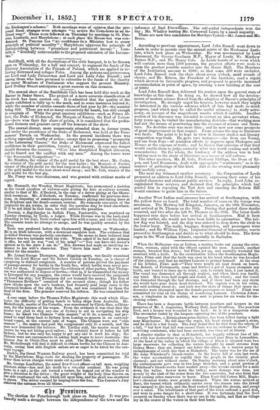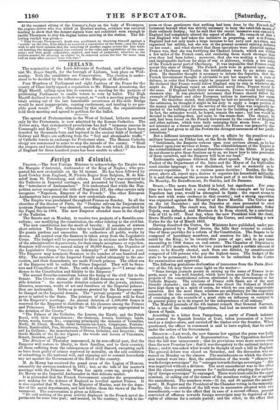'1ir Vrnriurro.
The election for Peterborough took place on Saturday. It was pro- fessedly made a struggle between the independence of the town and the influence of Earl Fitz william. The self-styled independents won the day ; Me. 'Whalley beating Mr. Cornwall Lewis by a small majority. Them are now two candidates for Merthyr-Tydvil—Mr. James and Mr. Bruce.
According to previous appointment, Lord John Russell went down to Leeds in order to preside over the annual soiree of the Meehanics' Insti- tute, which took place on Wednesday. Ho was accompanied by Lord Beaumont Sir George Goodman M.P. Mayor of Leeds, Mr. Matthew Baines MiP., and Mr. Henry Cole. As Leeds boasts of no room which will contain more than 1500 persons, the greatest efforts were made to cram the greatest possible number into the Music Hell. The Members of the Institution amount to 2000 ; so that some 500 were excluded. Lord John Russell took the chair about seven o'clock, amid rounds of cheers ; and Mr. Kitson, the President of the Institute, read a report which showed its favourable progress, and proposed to provide increased accommodation in point of space, by erecting a new building at the cost of 8000/.
Lord John Russell then delivered his oration upon the general state of knowledge at this time. In doing so, he showed how all the develop- ments of modern science flowed from the adoption of Bacon's principles of investigation. He strongly urged his hearers, however much they might be interested in the various sciences which of late had made so much progress, (and which may be called the useful sciences,) to study astro- nomy, on account of the magnificent results which it unfolds. Another section of his discourse was intended to correct an idea prevalent when, forty years ago, he visited the manufacturing districts—that working men had not the means of penetrating into the recesses of science and litera- ture. No doctrine ever was more false ,- and lee now saw some prospects of great improvement in that respect. From science the step to literature was facile. The point to be kept in view in literary studies and literary composition was truth. He gave two instances—one from one Young, and one from Pope—of mistaken efforts to improve upon Shakspere and Horace at the expense of truth ; and he hinted that criticism of that kind would enable them to judge correctly what was worth reading and worth remembering. On the whole, the tendency of the address was to lead working men to the study of literature as a means of self-culture.
The other speakers, Mr. H. Cole, Professor Phillips, the Dean of Ri- pon, and Lord Beaumont, dealt with appropriate " sentiments," as is the manner of gatherings of this kind. And so the evening wore pleasantly and usefully away. 1 The next day witnessed another ceremony : the Corporation of Leeds I presented an address to Lord John Russell, expressing their sense of his exalted character and etainent public services. In reply, Lord John re- capitulated those services, and declared that the principles which had guided him in repealing the Test Acts and enacting the Reform Bill would continue to guide him in the future.
Another West Indian mail-steamer has arrived at Southampton, with the yellow fever on board. The total number of cases on the voyage was seventeen. The Medway left Kingston, Jamaica, on the 10th November, and arrived at St. Thomas on the 16th. During that period three deaths occurred, and two after she left St. Thomas on the 20th. The latest death happened nine days before her arrival at Southampton. Had it been one day earlier, she would not have been liable to quarantine. The yel- low flag was hoisted, and the ship was ordered to drop down the river to the lower buoy. The mails, baggage, despatches, and passengers were landed ; and Sir William Pym, Inspector-General of Quarantine, was to proceed to Southampton and decide as to what should be done. The fever rages in the West Indian Islands, especially in Barbados.
When the Melbourne was at Lisbon, a mutiny broke out among the crew. Flinn, seaman, sided with the officers against the men. Lamont, another seaman, knocked him down; but Flinn got up, and mortally wounded the assailant with a knife. In the examination before the Southampton Magis- trates, Flinn said that the knife was open in his hand when he was knocked off the pigstye, and that he stabbed Lamont to protect himself. At the close of his defence, Flinn said—" They were nearly all mad drunk on board. One Robert, of Portsmouth, came and fetched a pot of liquor alongside any berth, and wanted to force me to drink ; aud, to satisfy him, I just tasted it. The vessel was dismasted all through neglect, and when there was hardly any wind. Men were half stupid and drunk at the wheel ; and the vessel was dismasted through the bad steerage, and if there had been any storm she would have gone down head-foremost. The captain was in his cabin, and said nothing about it; and such was the state of things that many in- decencies were attempted upon the female passengers on board." Flinn was committed for trial on the charge of murdering Lamont. Christian Johan- son, a ringleader in the mutiny, was sent to prison for six weeks for dis- obeying orders.
There has been a desperate battle between poachers and keeper& in the preserves of Mr. J. Augustine, Wethery Hall, near Swaffham. 1 he poachers fired, and a keeper was wounded in the back : he is in a dangerous state. The encounter ended by the keepers capturing two of the poachers. George Wilson, a Birmingham prize-tighter, has been killed during a fight near Manchester. He fell near the ropes, his head struck against a stone, and he died in a few hours. The Jury found that he died from the effects of a fall, " but how that fall was caused there was no evidence to show." The surviving combatant, who had been arrested, was then set at liberty.
A disaster similar to that at Holmfirth, but happily without loss of life and with less destruction to property, has occurred near Bury in Lancashire. At the head of the valley in which the village of Elton is situated were two large reservoirs for collecting the waters brought by small streams from Cookey Moor ; they are formed one below the other, in a narrow gorge by embankments of earth like that at llolmfirth. The water was for the use of Mr. John Whitehead's bleach-works. In the heavy fall of rain last week, the water accumulated so rapidly that the people in the vicinity grew alarmed; and not without cause. On Sunday morning about nine o'clock, trio embankments gave way in two large breaches, and a great portion of Whitehead's bleach-works were washed away—the wrecks carried for a mile down the valley. Lower down the valley, more damage was done, not merely by the rush of the water from the two reservoirs, but also from that flood causing other reservoirs to burst. Elton Ford Old Cotton Mill, Muck- low's chemical works, were greatly damaged. When the waters arrived at Bury, the tunnel which ordinarily carries away the stream into the Irwell was unequal to the task, and the flood rushed through the streets, and swept over a canal. The inhabitants of that part, of the town suffered a good deal, and were in some danger for a short time. It was fortunate that the flood. occurred on Sunday when there was no one in the mills, and that no village lay in the course of the waters in their first burst.
At the resumed sitting of the Coroner's Jury on the body of Thompson the engine-driver who was killed at Heyford station, evidence was received tending to show that the danger-signals were not exhibited soon enough to enable Thompson to stop his engine before arriving at the station. The fol- lowing verdict was given-
" That George Thompson's death was accidental, by throwing himself against a ' scotch' on the line, from which he received a concussion of the brain ; and the Jury wish to add their opinion that the removing of another engine across the line with- out hoisting the danger-signal was contrary to the rules and regulations of the com- pany; and that great culpability, neglect, and want of judgment, attaches to the station-master for allowing an engine to be removed across the line for more than half an hour after another train was due."



























 Previous page
Previous page